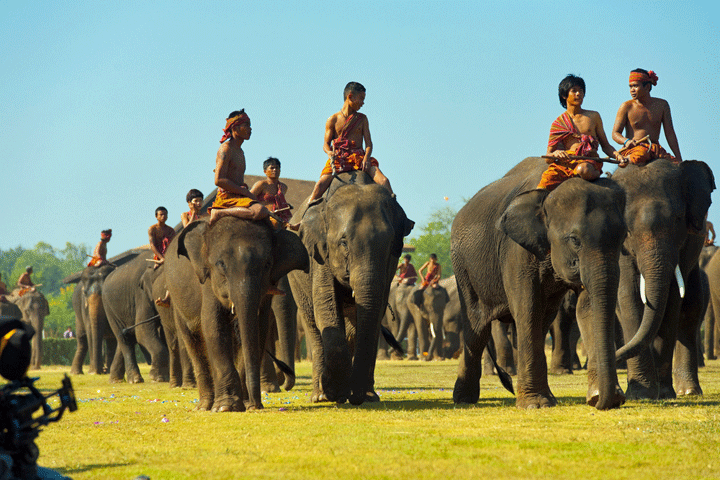Elephants and religion

"Elephants were not only used in wars and for heavy work in forestry, but are also considered sacred in Thailand.” My excellent guide in the Elephant Conservation Center in Lampang continues her story, after which she explains some religious aspects.
Saint Jumbo
Jumbo's sacred worship came over from India and has a lot to do with the Hindu god Ganesha, who is often depicted with an elephant's head including a trunk. He is the son of the gods Parwati and Shiva and Ganesha is known to help with all the obstacles that we encounter in this earthly life. And dear holidaymakers, he is also the patron saint for us travelers. If you ever lived in the Christian mind that it was Christopher, forget that and take refuge in Thailand and sure enough in India, to Ganesha the elephant god.
You will find it at many temples. Very old archaeological finds with images and inscriptions of and about elephants have been found in many places throughout Thailand. Within Buddhism, the elephant is a symbol of greatness, strength, intelligence, stability and grace. In the more Indian Brahmanism there is the myth that elephants from under the globe support the entire universe.
Many believe that elephants are sacred and so the Thais are caring, humble and careful towards them. Exceptions prove the rule here as everywhere.

Elephant festival in Surin
Surin
Every year during the third weekend of November in Surin, the famous elephant festival takes place. More than three hundred elephants, mostly from the small town of Ta Klang, participate. However, the deeper meaning of this spectacular event goes further. As mentioned, the elephant has something sacred for the Thai and especially in the village of Ta Klang, about 50 kilometers from Surin, the elephant is considered a member of the family. Many years ago, the inhabitants were true specialists in catching wild elephants and the place was the center of the elephant trade. Today, elephants are no longer caught, but many of the inhabitants have an elephant that they regard as a housemate.
When a baby elephant is born, the woman's mother tears a strip from her sarong and fastens it around the young animal's neck. A tradition that she also carries out at the birth of her own child as a gesture that she will ensure that the newborn grows up well and safely. Many people attribute magical powers to the Suays, as the inhabitants of Ta Klang are called, partly because of their great knowledge of elephants.

Dad Chang
A completely different ceremony is the expression Pa Chan, which comes from the north of the country, which means to separate. And this applies not only to animals but also to humans. In humans it often degenerates into a kind of war, but in this context it concerns the separation of mother elephant and her calf, after which the young animal goes to the elephant school. Not so long ago that meant training for work in forestry.
Prior to the divorce, an auspicious time is set and the equipment for the ceremony, including incense sticks, candles, nuts, rice, and the like, is assembled.
When the day comes, a very knowledgeable elephant owner, who must be of impeccable conduct, pronounces the prayers. Immediately afterwards, mother elephant and her child are separated.
It is a touching story and to express that I take out my handkerchief with a smile. “But…” she wants to continue her story when I interrupt her; "First we'll have a coffee and then you can tell us more."


Good story. But, as a representative of our Kingdoms, did you also get to see the Royal Stables? The white elephants fascinate me but I have never seen them.
Unfortunately, the king's white elephants remain hidden from visitors. See also the story posted on December 13 “The power and strength of the elephant.”
I saw some of them a few years ago – I thought it was 2012 – when the King visited Ayutthaya. There were six of them.
White is of course exaggerated. They have a pale or pink skin color.
By the way, they have to meet certain criteria to get the name “white elephant”.
https://nl.wikipedia.org/wiki/Witte_olifant
http://www.ad.nl/ad/nl/1013/Buitenland/article/detail/3875812/2015/03/01/Boswachters-vangen-zeldzame-witte-olifant.dhtml
Thanks for this story.
Learned something about Thailand.